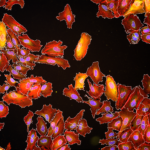Lien vers Pubmed [PMID] – 15186428
Mol. Microbiol. 2004 Jun;52(6):1827-44
Numerous, overlapping global regulatory systems mediate the environmental signalling controlling the virulence of Salmonella typhimurium. With both extra- and intracellular lifestyles, unravelling the mechanisms involved in regulating Salmonella pathogenesis has been complex. Here, we report a factor co-ordinating environmental signals with global regulators involved in pathogenesis. An S. typhimuriumDeltarelADeltaspoT strain deficient in guanosine tetraphosphate (ppGpp) synthesis was found to be highly attenuated in vivo and non-invasive in vitro. The DeltarelADeltaspoT strain exhibited severely reduced expression of hilA and invF, encoding major transcriptional activators required for Salmonella pathogenicity island 1 (SPI-1) gene expression and at least two other pathogenicity islands. None of the growth conditions intended to mimic the intestinal milieu was capable of inducing hilA expression in the absence of ppGpp. However, the expression of global regulators of Salmonella virulence, RpoS and PhoP/Q, and RpoS- and PhoP/Q-dependent, non-virulence-related genes was not significantly different from the wild-type strain. The results indicate that ppGpp plays a central role as a regulator of virulence gene expression in S. typhimurium and implicates ppGpp as a major factor in the environmental and host-dependent regulation of Salmonella pathogenesis.

